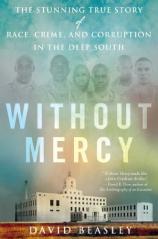Without Mercy: The Stunning True Story of Race, Crime, and Corruption in the Deep South
Review
Without Mercy: The Stunning True Story of Race, Crime, and Corruption in the Deep South
Eurith Dickinson Rivers, known as Ed, was Governor of Georgia for four years during the New Deal era, during which he brought many beneficial programs to the state. But he and his cronies also brought the shame of racism to a new height, granting clemency to a number of convicted white murderers and ordering the execution of many blacks who were never offered so much as a routine appeal.
David Beasley, former editor for the Atlanta Journal-Constitution, focuses on one horrific day, December 9, 1938, when six black men were electrocuted in Georgia in less than two hours. A white man who committed incest with his daughter and then strangled her baby and buried it in an unmarked grave was slated to die that same day; Rivers commuted his sentence to life imprisonment. The pattern --- pardon for the whites and speedy trials ending in execution (better, some opined, than lynching) for blacks, especially those who committed crimes against whites --- was repeated again and again in the state, while the policies of Rivers, who made no secret of his affiliation with the Ku Klux Klan, held sway. Around the same time as the crimes alleged against the six black men were being committed, a white preacher killed his own son for the insurance money in a twisted plot to get enough cash for a shiny new car. He escaped the chair.
"Though the electric chair is now a 'museum piece' in Georgia, death by lethal injection is still the law of that state. Beasley builds his thesis case by case."
Equally disgraceful for Georgia during Rivers’s regime was the possibility of buying one’s way out of the chair. This had been soundly proven when two college boys from wealthy families went on a senseless killing spree, yet avoided execution and were eventually sprung from prison, proving, as one of them later stated, “You can’t hang a million dollars.” Rivers’s corrupt policies and later internal squabbles with the Klan ultimately led to his downfall and economic woes for Georgia.
Even Thurgood Marshall and the NAACP exhausted all their efforts to save some of the men accused and condemned to die that December day in 1938. The blacks were little more than names to the system that condemned them, their deaths unheralded, their bodies often sold for medical research. Meanwhile, white criminals might become famous, their life stories familiar to the press and the public.
Though the electric chair is now a “museum piece” in Georgia, death by lethal injection is still the law of that state. Beasley builds his thesis case by case. Over and over again, the history books establish that there was no mercy for blacks, while every effort seemed to be made to save white criminals from ignominious, probably painful and sometimes prolonged, death in the electric chair. Beasley retains his reporter’s objectivity as he records the facts relevant to this account, noting that one of the rich boys who was released by Governor Rivers spent much of what he himself considered a wasted life writing about “the death penalty’s inequality, using his own life story as an example.”
Reviewed by Barbara Bamberger Scott on March 7, 2014
Without Mercy: The Stunning True Story of Race, Crime, and Corruption in the Deep South
- Publication Date: January 28, 2014
- Genres: History, Nonfiction
- Hardcover: 288 pages
- Publisher: St. Martin's Press
- ISBN-10: 1250014662
- ISBN-13: 9781250014665




